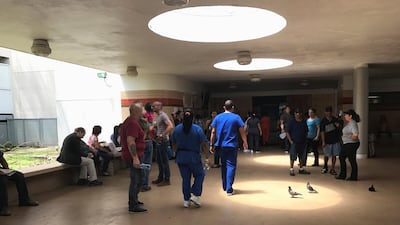Puerto Rico's medical services are in critical condition in the wake of Hurricane Maria.
The strongest storm to hit the island in decades has left hospitals flooded, strewn with rubble and dependent on diesel generators to keep the neediest patients alive.
The precarious shape of the island’s medical facilities is adding to the misery and devastation of this US territory, whose 3.4 million residents are American citizens. For some, the only option is to evacuate to the United States for treatment.
Among them is Cheira Ruiz and her baby girl Gabriellyz, who was born two weeks ago with a serious heart defect. The newborn was admitted to the Centro Cardiovascular de Puerto Rico in the capital shortly before Maria slammed into the island last Wednesday, but it was impossible for doctors to operate in such precarious conditions.
Gabriellyz was among the first of the infants cleared to take a medical flight out of Puerto Rico after the storm. Her parents, who live two hours south of the capital, found out the good news on Friday when emergency officials knocked on their door in the town of Guanica and told them to pack for the trip to Miami. With phone service out, the doctors had called one of the island's radio stations, which broadcast their plea for help in locating the couple. But hours before the flight was scheduled to depart, the parents learnt there was only room for one of them. Mother and baby would fly alone to Miami.
“I’m trying to be strong,” Ms Ruiz said on Saturday.
_________________
Read more:
Puerto Rico dam on verge of collapse as 70,000 ordered to evacuate
Power knocked out across Puerto Rico
Maximum-strength Hurricane Maria batters St Croix, heads for Puerto Rico
_________________
In the days since the storm, the island's residents have awakened to an altered reality. Food is in short supply. The island's electrical grid is down and may remain so for months. Motorists and pedestrians queue for blocks trying to secure scarce fuel to power vehicles and generators.
Cellular service, internet, and e-mail have virtually disappeared, hurling a modern society into a bygone era with radio becoming a primary source of information.
For hospitals across this region, the challenges are mounting. After the power went out, backup generators at some hospitals failed quickly. Other hospitals are running critically low on diesel. Fuel is so precious that deliveries are made by armed guards to prevent looting, according to Dr Ivan Gonzalez Cancel, a cardiovascular surgeon and director of the heart transplant programme at Centro Cardiovascular.
“Another hospital wants to transfer two critical patients here because they don’t have electricity,” Dr Gonzalez Cancel said. “We can’t take them. We have the same problem.”
Medical staffers are also running low on gasoline for their daily commutes to work. Puerto Ricans are queuing as long as seven hours at the island's few functioning filling stations. Marilyn Rivera Morales, a nurse at the centre, said she only had enough petrol to drive to the hospital for two more days.
“How will they keep coming here if they don’t have gas?” Dr Gonzalez Cancel asked.
But a lack of fuel is just the beginning. The cardiovascular centre is “in shambles”, the surgeon said. Without air conditioning, the walls of the operating room are dripping with condensation and floors are slippery. Most patients have been discharged or evacuated to other facilities, but some patients remain because their families cannot be reached by phone.
On the sidewalk outside the cardiac centre on Saturday, Jorge Rivera and his wife Dorca approached Dr Gonzalez Cancel to ask about the woman’s father, a patient still inside waiting for triple-bypass surgery. The couple are residents of Savannah, Georgia who were in Puerto Rico to care for their loved one.
With the hospital scaling down operations and the island's infrastructure on its knees, the surgeon estimated he would not perform another open heart surgery for a month or more. His advice to the couple: leave.
“I am talking to you, not as a physician, I am talking to you as a human being,” he said. “Get him on a plane. You can be in Miami in two and a half hours.”
But leaving is not simple. With the island's main airport still crippled, Dr Gonzalez Cancel said he needed to secure a special waiver from authorities to obtain the medical evacuation flight for baby Gabriellyz. Travellers at the airport on Sunday were told that passengers who do not already have tickets may not be able to secure flights out until October 4.
Dr Juan Carlos Sotomonte, the medical director of the cardiovascular unit at the Centro Medico, the island's largest public hospital, said intervention — divine or otherwise — is needed fast.
"If this is not taken care of, people are going to start dying."

